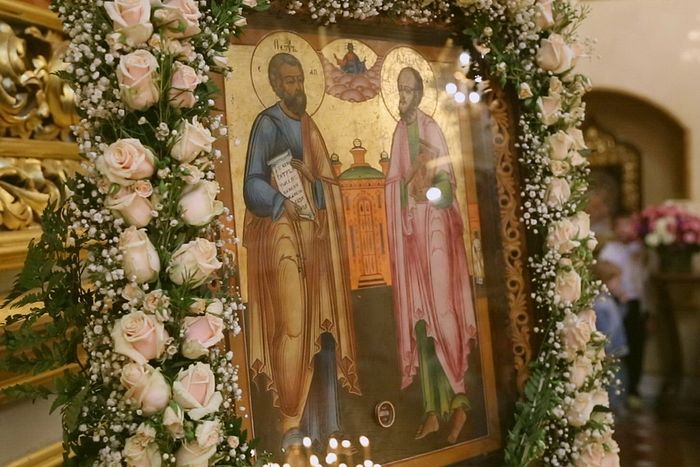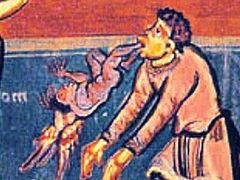In actuality, the most unique periods in the life of the Church are the periods of the multi-day fasts. Four such fasts have been established by the holy Orthodox Church—Great Lent, the Nativity Fast, the Dormition Fast, and the Peter and Paul Fast.
Two of these are strict, except for on great feast days, with even the partaking of fish being forbidden during them. The severity of Great Lent is also reflected in the services, when the full Liturgy is celebrated only on Saturdays and Sundays, with the Liturgy of the Presanctified Gifts being served on Wednesdays and Fridays.
Now we are all entering in upon the fast bearing the name “Peter and Paul,” because it ends on the day of the preeminent Apostles Peter and Paul. It’s known that it was established in the first centuries of Christianity, although then it wasn’t connected with the names of the Apostles Peter and Paul, but was intended for those who, for one or another reason, couldn’t maintain the strictness of Great Lent.
The main peculiarity of the Peter and Paul Fast is that its duration is always different depending on the dating of Pascha. This fast begins after the week of All Saints, which is served on the Sunday following the feast of Holy Pentecost.
St. John Chrysostom says: “Therefore, I beseech … that knowing the benefit of the fast, you wouldn’t lose it by negligence, wouldn’t be saddened by its advent, but would rejoice and celebrate.
This fast isn’t so strict as Great Lent, but all the same don’t start to think that you can break it, citing any life circumstances or health problems. As a rule, children, people of an advanced age, pregnant woman, and seriously ill people, with the blessing of their priest, are given a concession to not uphold the full austerity of the fast in all its regulations. But we must always remember: the period of fasting is a time when people should be in church as much as possible, be with God, and to see in your neighbors the image and likeness of God.
We must always remember that fasting is given to us for the spiritual joy of knowing we are called to repentance, to remind ourselves again in this time about our sinfulness, and after the Paschal period to at least for a while remind ourselves of the true meaning of fasting, which we experienced in the hymns and services of the holy forty days.
And then, becoming closer to God, we will become closer to one another, we will become absolutely better, although but a little, and we will be able to forgive our loved ones even those offenses which earlier seemed simply unforgiveable. For this we are given fasting days, time to pay special attention to ourselves, for our internal peace and our spiritual condition.
According to St. Basil the Great, “Fasting is an ancient gift; fasting is the gem of the fathers. It is for modern humanity. Fasting was legalized in paradise. Adam received such a first commandment: of the tree of the knowledge of good and evil, thou shalt not eat of it (Gen. 2:17). And this: thou shalt not eat is the establishment of fasting and abstinence.” And remembering this first commandment, given by God to our forefathers in paradise, we will try to abstain not only from meat and dairy products, but we will try to correct ourselves, try to eradicate malice from within ourselves, intolerance, negligence in prayer, and inattention to the needs of those around us.
If we place our hope on the regenerative power of the Church and its Holy Mysteries, then the Lord will undoubtedly touch our souls, strengthen us, and grant us sincere love, that we might all with spiritual joy pass this time of fasting and with this same joy honor the preeminent Apostles Peter and Paul on their day of commemoration, who to the greatest extent of all the disciples of Christ labored in His field and thanked the Lord for all His great blessings which are abundantly and unceasingly poured out upon us! And may the Lord save us all!





